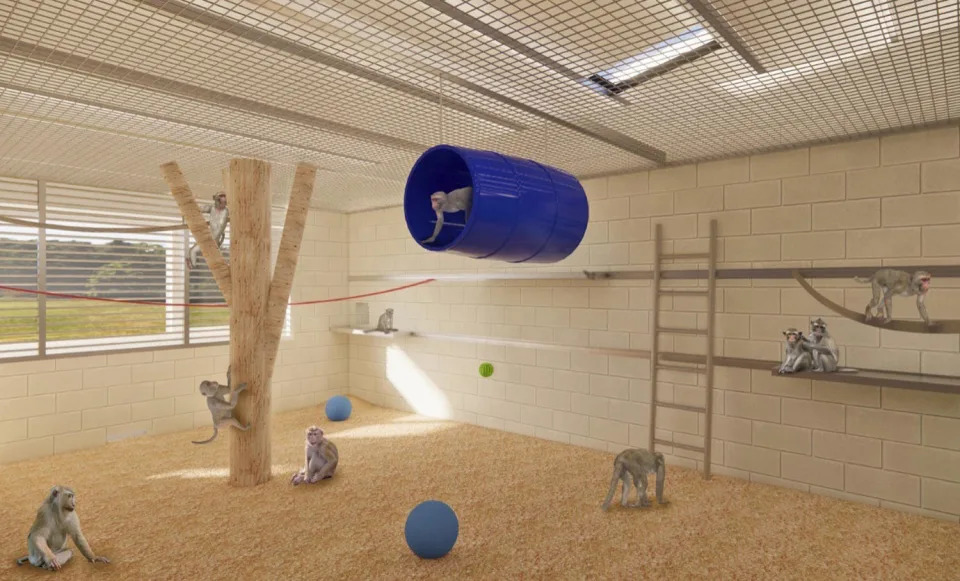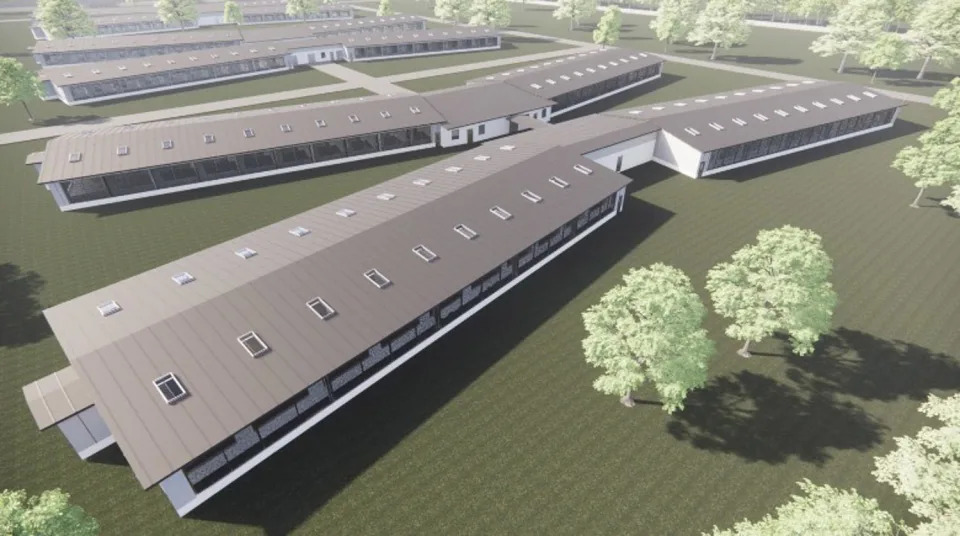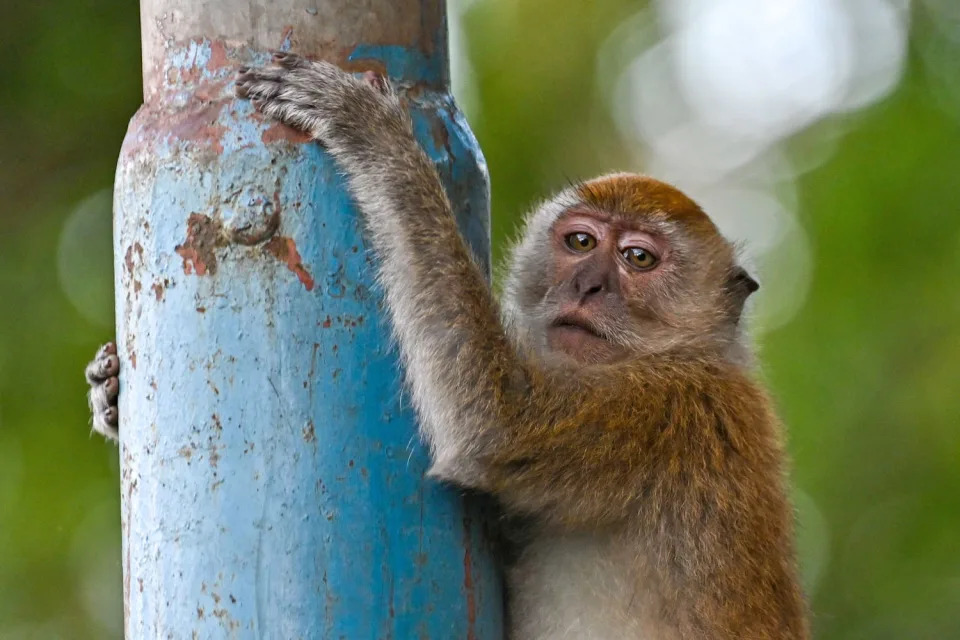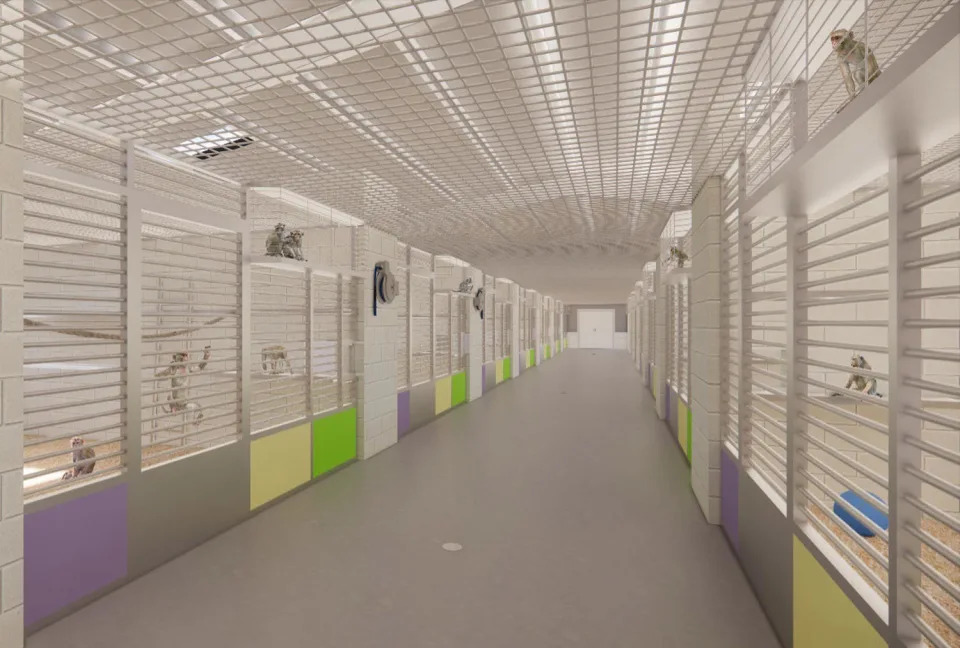Kayla Steinberg
Updated Thu, June 13, 2024 at 8:32 AM MDT·7 min read
74
A plan to build a massive monkey-breeding facility that could eventually house 30,000 long-tailed macaques in a small Georgia city has sparked a multipronged legal battle pitting residents against a company whose executives have faced scrutiny for their past handling of animals destined for medical research.
The fate of the facility is in the hands of the Georgia Court of Appeals, which will consider Thursday whether to overturn the validation for a bond that the city of Bainbridge promised to Safer Human Medicine, a company started by animal research industry veterans. It received the bond after Bainbridge leaders greenlighted the project in December.
But in the ensuing months residents, with help from People for the Ethical Treatment of Animals, or PETA, began to push back against the project.
“It feels like somebody’s going to drop a bomb in the middle of everything that we’ve worked and built,” said lifelong Bainbridge resident June Faircloth. “We can’t sit back and let it happen.”

An artist's rendering of a planned monkey enclosure in Bainbridge, Ga. (Safer Human Medicine)
It’s not the first such project to have gotten local opposition — with support from PETA — at a time when researchers say they are running low on monkeys for medical testing. Long-tailed macaques are among the most common monkeys used in research in the U.S., and while monkeys are used in a fraction of a percent of animal studies, researchers say they’re critical.
A monkey-breeding facility in Brazoria County, Texas, planned by the company Charles River Laboratories was put on hold this year after local opposition that was aided by PETA arose. PETA also pushed back after a Chinese-owned company bought land in Florida a couple of years ago for a possible primate facility — the plan was eventually scrapped.
The battles highlight how animal rights activists, together with residents, have found some success in opposing new facilities despite the ongoing needs of scientists.
Animal testing for research purposes has a long history — as does opposition to it. And while many scientists have advocated for more humane treatment of animals used in research, they have also warned that stopping such research would seriously hinder many medical advances. Animal testing is regulated in the U.S. by the Animal Welfare Act of 1966.
Dr. Paul Johnson, the director of the Emory National Primate Research Center in Atlanta, said monkey research helped develop Covid vaccines, an HIV vaccine that’s in clinical trials and belatacept, a drug used in kidney transplantation.
The testing can be traumatic for the monkeys. Some are euthanized, while others cycle through studies.
“We study monkeys because their brains are wired very much like human brains,” Johnson said.
In Bainbridge, a town of about 14,000 in the southwest corner of Georgia, residents began to turn on the macaque project after the December vote.
Faircloth, a one of the main organizers of the Bainbridge pushback, turned her interior design office into a hub for community members fighting to, in their words, “Stop the Monkey Farm” — with signs, flyers and hats interspersed among flooring and fabrics. Many protested and spoke at town halls. Some set up a website and a Facebook group that has grown to more than a thousand members. And every Tuesday night, they get together and pray.

Safer Human Medicine intends to build multiple monkey enclosures on a property in rural Georgia. (Safer Human Medicine)
Residents have voiced concerns about the facility itself to the possibility that monkeys would escape — which has occasionally happened at other facilities in the U.S., including one run by Oregon Health & Science University in Portland, though with no reports of harm to nearby residents.
“We’re looking at a jungle: noise, stink and the possibility of diseases,” said Penny Reynolds, who lives across from the land set aside for the facility in Bainbridge.
Safer Human Medicine has assured residents that it would take every precaution to make sure all waste would be contained in its facilities and sent to the city wastewater treatment plant. It also said that most noise would stay within the facility and that there wouldn’t be a “noticeable smell.”
Greg Westergaard, the CEO of monkey breeder Alpha Genesis, says a lot goes into setting up monkey breeding facilities.
“There’s a lot of training involved; there’s a tremendous amount of infrastructure involved,” he said. “It’s going to smell, and you’re going to have runoff from the cleaning.”
Bainbridge residents have pointed to the backgrounds of some of Safer Human Medicine’s executives — two of whom previously served in leadership positions at companies that have come under scrutiny — as reasons to doubt their commitment.
Safer Human Medicine CEO Jim Harkness was the chief operating officer of Envigo, a company that pleaded guilty last week to neglecting thousands of dogs and agreed to pay a record $35 million fine. Chief Operating Officer Kurt Derfler left his job at Charles River Laboratories last year, just months after the Justice Department subpoenaed it as part of its investigation of possible wild monkey smuggling from Cambodia. Charles River Laboratories said at the time that any concerns about its role were “without merit.”
Neither Harkness nor Derfler was individually charged in relation to those cases.
Safer Human Medicine declined interview requests. It said by email, “Envigo was operating during unprecedented circumstances brought on by the pandemic.” It added, “We have been committed to operating responsibly and ethically for decades in this field and we will continue doing just that.”

A long-tailed macaque, also called cynomolgus macaques, climbs a pole in Indonesia in 2023. (Chaideer Mahyuddin / AFP via Getty Images file)
Safer Human Medicine said it wouldn’t be using wild-caught macaques — which can carry viruses like herpes B. The macaques would come from Asia, it said, without specifying where.
The community organizing in Bainbridge has moved the needle. Rick McCaskill, the executive director of the Development Authority of Bainbridge and Decatur County, said that what was once billed as a “tremendous investment” of almost $400 million and 260 jobs quickly turned sour. After backlash from the community arose, Bainbridge leaders voted in February to rescind their support for the Safer Human Medicine project.
“We felt like the divisiveness and the unrest in the community was outweighing the benefit of the project,” McCaskill said.
Research monkeys are bred at the seven National Primate Research Centers, each with its own breeding colony, as well as other facilities across the country. The National Primate Research Centers often use rhesus macaques, while pharmaceutical companies tend to use long-tailed macaques — the type Safer Human Medicine plans to breed.
There has been some movement away from animal testing for drug development, which was once required by the U.S. In 2022, President Joe Biden signed the FDA Modernization Act 2.0, allowing for alternatives to animals when possible. This year, several members of Congress introduced a bill to take it a step further — and facilitate a move away from animal research.
“It’s likely going to be a collection of alternatives, from AI to computer models to organs on a chip,” said Jim Newman, the communications director for Americans for Medical Progress, a group that advocates for medical testing on animals when needed. “But what we currently have available can only reduce animals by a certain amount.”

An artist's rendering of a planned monkey enclosure in Bainbridge, Ga. (Safer Human Medicine)
For now, researchers still depend on monkeys for some testing, and some animal researchers say the U.S. is experiencing a shortage of long-tailed macaques — reporting a more than 20% drop in imports in 2020 after China cut off its exports. They say prices for long-tailed macaques are skyrocketing.
Safer Human Medicine says it sees its planned facility as an answer to the shortage. It said it would start out with 500 to 1,000 monkeys and scale up. It said the money to build the facility would come from industry and private funding within the U.S. It wouldn’t share names.
It’s not entirely clear how much of the community is against the facility. Some local politicians who campaigned on opposing it didn’t win in recent elections, though it’s not apparent that their losses had anything to do with those positions.
Still, Faircloth said her group has no plans to back down.
“If we don’t stand up for our rights, then we’re just going to be rolled over,” she said. “We just can’t let that happen.”
This article was originally published on NBCNews.com
No comments:
Post a Comment